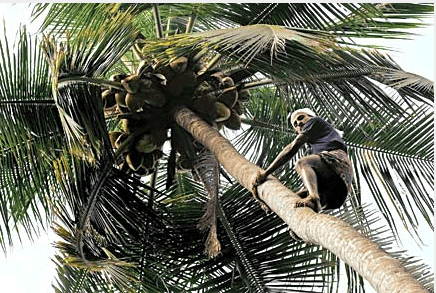In the last few years, vegan and vegetarian eating has become popular in the western world. Coconut is the latest nectar in the health market. Many companies in the UK and US are producing packaged ‘natural’ coconut water. Celebrities are endorsing and investing in these companies. While in India we are giving up coconut oil and using the more popular and well marketed expensive Saffola variations; people here are switching to less processed oils like coconut and olive. Kam kao par shuddh khao…eat less but eat pure, less processed food!
In my childhood coconut seemed so commonplace. I did not need a textbook to tell me why the coconut tree is called Kalpavriksha. I knew exactly why – I saw it in action!
The land outside my grandfather’s (Ajja’s) house was full of coconut trees (माड्डे रूकू) Once every few months a muscular but skinny dark man would come equipped with a scythe (कोय्ती) and rope made of coconut coir(राज्जो). Very deftly, he would tie the rope around his feet and climb up the tree in a few seconds. This was no mean feat – one slip and the man could lose his life or his limbs! As we watched him in awe, Ajji would shoo us kids away from around the trees. Soon we could hear the scythe going khat..khat and the heavy coconut fruits falling down thuddd on the ground. The man also axed down dried palm leaves(मडल). For those wanting to see this stunt, here is a video I found on YouTube.
Once this man finished his job, we kids would scamper around the trees to help Ajji collect all the coconut fruits and put it in a basket (कुर्वे). Later, my Ajja or Mama would peel this tough skin off to extract hard shelled coconut. The coir would be used for fuel. I used to help Ajji prepare brooms (सार्निगुन्टो) from the midrib of the leaves (सार्निवीर). It was such a fun task slicing the lamina away from the midrib using a blunt knife. The lamina was used as fuel. Sometimes, the entire palm leaf was woven into a mat that could be used to create temporary walls and roofs.
My Ajji would break open a few coconuts into halves using कोय्ती and spread out in the sun on a mat (मांद्री) covered with a net to prevent crows from picking them up. This was done every morning at around 10 am. Later in the afternoon around 4 pm these were collected and stored back inside the house to prevent evening moisture from seeping into them. This process was repeated every day until the inner flesh was dry enough and separate from the shells (कर्टी). You can imagine how much patience this needed!! The dried flesh (खोब्री) is a great snack – we used to munch on it as we helped Ajji lay it out for drying every day. After separating flesh from the shells Ajji would pack them off to be sent to the oil mill to prepare coconut oil. The shells were used for fuel.
So you see nothing was ever wasted!!
Why am I prefacing this rhyme with such a long story? Because these scenes play in my mind every time I say this rhyme. In memory of those beautiful days:
For baby girls:
डोळ्ळि रे डोळ्ळि
माड्डे रुक्कार चळ्ळी।
पाय निसोर्न पळ्ळी
तिगेल डोल्लि प्हुटून गेल्लि ।।
ḍoḻḻi re ḍoḻḻi
māḍḍe rukkāra caḻḻī।
pāya nisorna paḻḻī
tigela ḍolli phuṭūna gelli ।।
For baby boys:
डोळ्ळा रे डोळ्ळा
माड्डे रुक्कार चळ्ळो।
पाय निसोर्न पळ्ळो
तागेल डोल्लो प्हुटून गेल्लो ।।
ḍoḻḻā re ḍoḻḻā
māḍḍe rukkāra caḻḻo।
pāya nisorna paḻḻo
tāgela ḍollo phuṭūna gello ।।
The best way to enact this song is:
Line 1: Move your hand over your baby’s tummy (डोळ्ळो)
Line 2: Do a climbing up action with your index and middle finger- from tummy to neck
Line 3: Do a climbing down action with your index and middle finger – from neck to tummy
Line 4: Tickle the tummy and waist
Afternote: Just remembered a random incident. Once my Ajji said ‘chai…aile pale dolla’ (चै…आयल् पळे डोळ्ळा) Entering the gate was a man with a tummy the size of a balloon, everyone called him Dolla. Chai is her word for saying observe…see…she did a nudging action. I don’t think anyone uses this word anymore.
One more such word is ‘जोके’ (Joke). Means take care. My grandparents used this word with us a lot asking us to be careful. My parents used जाग्रती (jagrati).
